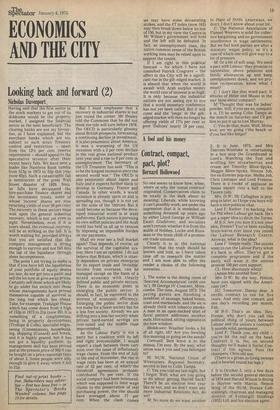ECONOMICS AND THE CITY
Looking back and forward (2)
Nicholas Davenport.
Having said that the first sector in the stock markets to get out of its doldrums would be the property market, I assigned the financial sector as the next beneficiary. The clearing banks are not my favourites, as I have explained, but the merchant banks which are not subject to such strict Treasury control and restriction — apart from the 121/2 per cent reserve requirement — should appeal to the speculative investor after their recent heavy falls. We have seen a leader like Hambros Bank tumble from 513p in 1973 to 53p this year (now 65p). Such a catastrophic fall is reminiscent of the great Wall Street disaster of 1929. Similar falls have devastated the hire-purchase finance shares and the investment trusts, some of whose 'income' shares are now returning yields of over 30 per cent! The recovery in these sectors must wait upon the general industrial recovery, which is not yet even in sight. Nevertheless, even if it is years ahead, the eventual recovery will be as striking as the fall. It is worth waiting for, provided always that you are satisfied that the company management is strong enough to survive and not fall into the lap of the liquidator through sheer incompetence.
The point I am trying to make is that if you have left the liquidation of your portfolio of equity shares too late, do not get into a panic and sell the lot now at give-away prices. Certainly sell those which are likely to go under but switch into those whose managements have proved themselves capable of survival in the long test which lies ahead. Take, for example, Trafalgar House which has come down from a high of 152p in 1973 to 21p (now 30). It is something of a conglomerate, being in property development (Trollope & Co11s), specialist engineering (Cementation), housebuilding, shipping (Cunard) and ' hotels, and it is highly geared, but it has not got a liquidity problem, its management skill has been proved and at the present price of 30p it can be bought on a price/earnings ratio of about 2. Some people were silly enough to give it away when it fell to 21p. But I must emphasise that a recovery in industrial shares is not just round the corner. Mr Healey told the Commons that he did not think the tide will turn before 1976. The OECD is particularly gloomy about British prospects, forecasting a continuing decline in investment. It is also pessimistic.about America. It sees a worsening of the US recession with a 2 per cent decline in the real gross national product next year and a rise to 8 per cent in unemployment. The Secretary of the US Treasurer has said: "This is to be the longest recession since the second world war." The OECD is also pessimistic about Japan and Italy and it expects further slack to develop in Germany, France and Canada. In other words, a world recession is already upon us and is spreading out, though it is not yet on the scale of the 'thirties. But it could become so because the developed industrial world is at sixes and sevens. Each nation is pursuing its own selfish policies and the Arab world has held us all up to ransom by imposing an impossible burden on our payments.
Shall we ever see a bull market again? That depends, of course, on the survival of the capitalist system. Here I am an optimist. I do not believe that Britain, which is utterly dependent on private enterprise for its export trade and 'invisible' income from overseas, can be managed except on the basis of a mixed economy with clearly defined public and private sectors. There is no economic point in enlarging the public sector: it should, in fact, be narrowed in the interest of economic efficiency. Enlarging the public sector does not make for a fairer society but for a less free society. Already we are drifting into a less fair society when private hard-earned savings are over-taxed and the middle class impoverished. As the Labour Party is not a party but a coalition with its left and right irreconcilable, I would expect a clash between them very soon over the issue of inflationary wage claims. From the end of July to the end of November, the rise in wage rates has been at an annual rate of 32 per cent, of which the threshold agreements probably contributed 71/2 per cent. If the social compact had been honoured, which was supposed to limit wage claims to the preservation of real purchasing power, the rise should have averaged about 17 per cent. When the clash comes
we may have some devastating strikes, and the FT index (now 163) may then break down below its low of 150, but in my view the Centre in Mr Wilson's government will hold and the left will be defeated. ' In fact, as unemployment rises, the native common sense of the British working men may be relied upon to support the centre.
If I am right in this political forecast — for which I have not consulted Patrick Cosgrave — the effect in the City will be a significant rise in the gilt-edged market. It is absurd that when the world is awash with Arab surplus money the world rate of interest is so high. It is only because the industrial nations are not seeing eye to eye that a world monetary conference has not yet been called. But it will come and the 'longs' in the giltedged market will then no longer be offering yields of 171/2 per cent or poor `Daltons' nearlY 18: per cent.


























 Previous page
Previous page